Dashlane vs 1Password — Which Is Better in 2025? (Full Tests)
Dashlane and 1Password are both industry-leading password managers with reliable security and many features for convenience. However, I wanted to see which is the superior app, so I compared both across various categories to determine the better option.
During tests, I found that Dashlane and 1Password offer many reliable security and password management features. However, Dashlane stands out as the better option, as it includes a built-in VPN, a money-back guarantee, better support, and a completely free plan.
While 1Password has some unique strengths, like its travel mode, masked emails, and privacy cards, Dashlane emerges as the better option. It offers more value for money and is a more well-rounded password manager. Best of all, there’s a 30-day free trial and a 30-day money-back guarantee so you try Dashlane’s premium plans to see for yourself.
No Time? Here’s a 1-Minute Summary of Category Winners
Both Dashlane and 1Password are industry-leading password managers, so I’m not surprised that they’re equally effective in most categories. However, Dashlane stands out in a few categories, like ease of use, pricing, and customer support.
 |
 |
|
| Encryption | Uses AES 256-bit encryption to safeguard vault data. | Protects vault data with AES 256-bit encryption. |
| Two-Factor Authentication (2FA) | Supports two-factor authentication through various methods. | Offers multiple methods to set up two-factor authentication. |
| Password Storage | Has a secure vault with encrypted file storage and space for all your sensitive data. | Comes with a secure vault with file storage and support for various data types. |
| Auto-Save and Fill | Has excellent auto-save and auto-fill with phishing protection mechanisms. | Provides smooth and reliable auto-save and auto-fill functionality. |
| Password Generator | Comes with a built-in password generator. | Includes a built-in password generator. |
| Privacy | SOC 2 Type 2 certified with a zero-knowledge architecture. | Has a zero-knowledge architecture, is SOC 2 Type 2 certified, and has cleared multiple independent audits. |
| Password Auditing | Has a Password Health feature for auditing purposes. | Includes the Watchtower for password auditing. |
| Password Sharing | Provides tools for safe and secure password sharing. | Allows secure password-sharing. |
| Ease of Use | Has beginner-friendly and easy-to-install apps and extensions. | Provides user-friendly apps and extensions. |
| Extra Features | Includes passkey support, password health monitoring, dark web monitoring, and more. | Offers masked emails, passkey support, a travel mode, dark web monitoring, and more. |
| Device Compatibility | Works on Windows, macOS, Linux, Android, and iOS. | Supports Windows, macOS, Linux, Android, and iOS. |
| Customer Service | Includes live chat, ticket-based support, and an online knowledge base. | Offers email support, community forums, and an online knowledge base. |
| Price | Delivers more value for money with its plans. | Has multiple plans that offer good value. |
| Free Version | Includes a free plan. | Doesn’t have a free plan. |
| Money-Back Guarantee | Has a 30-day money-back guarantee. | Only has a 14-day trial. |
How I Tested and Compared Dashlane vs 1Password
I used the following criteria to compare these 2 password managers and determine the better choice:
- Encryption — I compared the encryption standards these apps use to safeguard the data in vaults.
- Two-Factor Authentication (2FA) — I checked if these apps allow additional security via two-factor authentication.
- Password Storage — I analyzed both apps’ vaults to see which offers better password storage.
- Auto-Save and Fill — I tested the auto-save and fill functionality in both apps to see which password manager offers more convenience.
- Password Generator — I used the password generators in both password managers to learn which one performs better.
- Privacy — I researched and checked which password manager has a more privacy-focused design.
- Password Auditing — I used the auditing tools in both password managers to see which is better for monitoring your overall password safety.
- Password Sharing — I compared how easy it is to share passwords using both these apps.
- Ease of Use — I checked which password manager has more beginner-friendly and easy-to-use apps.
- Extra Features — I compared the feature variety to see which password manager offers more.
- Device Compatibility — I analyzed which of these password managers works with a wider variety of devices.
- Customer Service — I talked to each app’s customer support to see which is more helpful.
- Price — I compared price plans to learn which password manager offers better value for money.
- Free Version — I checked whether these apps have free plans and which password manager has a better free version.
- Money-Back Guarantee — I looked at whether these password managers offer money-back guarantees and which app makes it easier to get a refund.
1. Encryption — Both Password Managers Use Unbreakable Aes 256-Bit Encryption
Having top-grade encryption is crucial for a password manager to ensure safety, and both Dashlane and 1Password offer unbreakable encryption. They use military-grade AES 256-bit encryption to safeguard the data on your vaults and ensure no one except you can access it.
I also like that both Dashlane and 1Password use end-to-end encryption. This means your data is encrypted locally on your device before being communicated with the app’s servers, thus ensuring hackers spying on your traffic can’t get your information.
While the master password is usually the only way to access your vault, you’ll be pleased to know that 1Password and Dashlane offer recovery keys. These recovery keys are provided when you set up your vault for the first time and let you regain access if you ever forget your master password.
Since both these passwords employ impenetrable encryption standards and have reliable recovery methods, they are tied in this category.
Encryption Winner: Tie
2. Two-Factor Authentication (2FA) — You Can Easily Set Up 2FA in Multiple Ways on Both Apps
Two-factor authentication (2FA) adds an extra layer of security to your vault besides the master password. So I was happy to see that both Dashlane and 1Password include multiple ways you can set up two-factor authentication. This makes it easy to add further protection for your sensitive data.
During my tests, Dashlane made it easy to set up 2FA. Navigate to the settings menu, access security settings, enable two-factor authentication, and set it up via your preferred method. You can set up 2FA on Dashlane via TOTP apps like Authy or through email. Dashlane doesn’t allow 2FA codes via text messages due to security concerns, though.
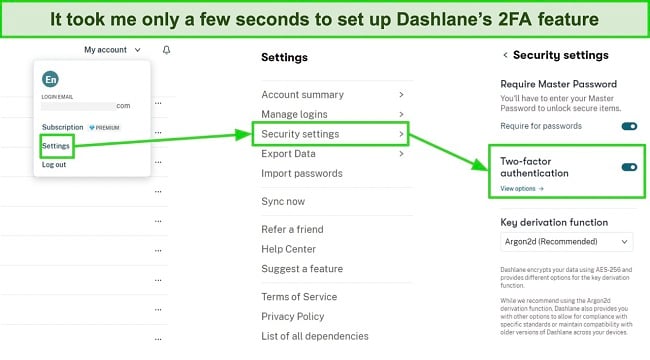
You should also note that Dashlane doesn’t allow USB keys as a second factor for two-factor authentication. You can use them to unlock your vault on Windows locally, but that’s it.
On the other hand, 1Password also allows 2FA via TOTP apps, email, and USB keys. It’s equally easy to set up two-factor authentication on 1Password via the settings menu, and your vault will be much safer once it’s set up.
Overall, since both apps allow multiple reliable two-factor authentication methods, it’s a tie in this category.
Two-Factor Authentication (2FA) Winner: Tie
3. Password Storage — 1Password’s Vault Offers Storage for More Kinds of Data
While both password managers include well-organized vaults, 1Password’s password storage was more impressive in my tests.
What helps 1Password’s vault stand out is that it offers storage for all kinds of sensitive data. You can store logins, credit cards, secure notes, bank details, databases, SSH keys, crypto wallets, API credentials, and more. I’ve never seen any other vault offer storage for so many different kinds of data.
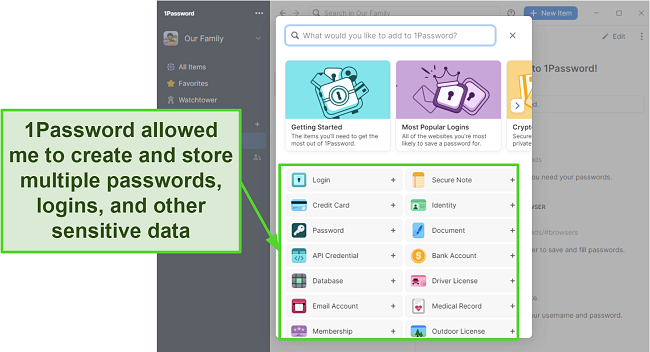
I also like that 1Password has an item history feature that easily lets you recover mistakenly edited or deleted items. It also lets you create multiple vaults for different purposes to make organization easier.
On the other hand, Dashlane’s vault offers storage for passwords, notes, identities, and payment details. You can save other data using the secure notes tab, but 1Password makes it much easier to save other types of information. To help with organization, Dashlane lets you make collections that hold certain kinds of logins.
You’ll be pleased to know that both password managers offer 1GB of secure file storage. So, you can use them to store sensitive files and documents that you don’t want others to access.
Overall, while both apps have reliable password storage, 1Password wins in this category. Its vaults have space for more kinds of information.
Password Storage Winner: 1Password
4. Auto-Save and Fill — Dashlane’s Auto-Fill Is Safer
Auto-save and fill are vital password manager features. They provide convenience and save lots of time when logging into websites online. In my tests, both these password managers showed they had reliable auto-save and fill, but Dashlane stood out more because of its built-in safety mechanisms.
While testing Dashlane, I found that its auto-save and auto-fill dialogs instantly appeared whenever needed. The app asked to save any new logins I used on websites, and the auto-fill feature showed up when I reassessed them. I tested various websites, including Facebook, Netflix, Namecheap, and more, and Dashlane’s auto-save and auto-fill never had issues.
What helps Dashlane stand out, though, is the built-in phishing protection in its auto-fill. When logging into ExpressVPN’s .xyz domain instead of the .com domain, Dashlane asked if I trusted the website. While the domain itself was safe, I was pleased to see that Dashlane picks up the slightest changes in domain names to protect against phishing attempts.
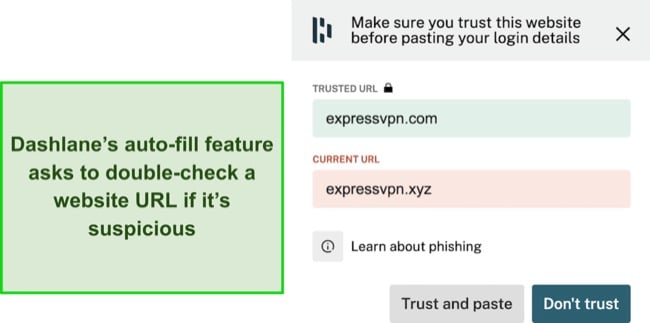
On the other hand, 1Password’s auto-save and fill features were also impressive. I had no trouble using the app’s auto-save or auto-fill on websites like Netflix, Facebook, and various others. The auto-save dialog always asked to save any new information I used, while the auto-fill appeared whenever I accessed a login page for a website.
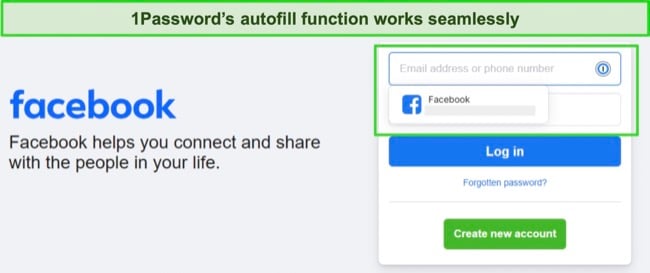
Overall, while both apps have reliable auto-save and fill functionality, Dashlane wins in this category because of its added phishing protection.
Auto-Save and Fill Winner: Dashlane
5. Password Generator — Both Apps Can Generate Unbreakable Passwords
Password generators help create safe and unbreakable passwords to use with your accounts, and both Dashlane and 1Password have secure password generators.
Dashlane’s password generator has a straightforward design that lets you configure if your passwords should include letters, digits, symbols, and similar characters. Plus, Dashlane lets you see a history of previously generated passwords, which is useful if you forget a password you made for an account.
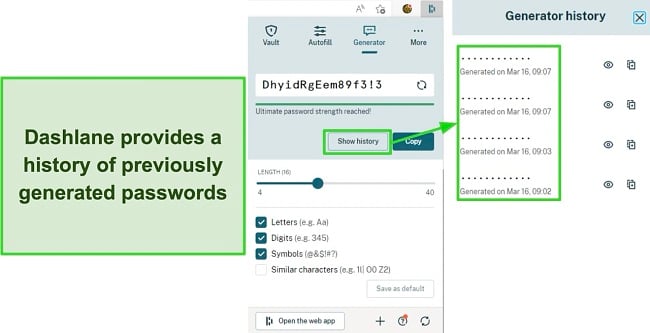
1Password’s password generator is equally effective and impressive. It lets you customize your passwords’ lengths and configure if it should have special characters, letters, and numbers. Also, 1Password can generate secure phrases.
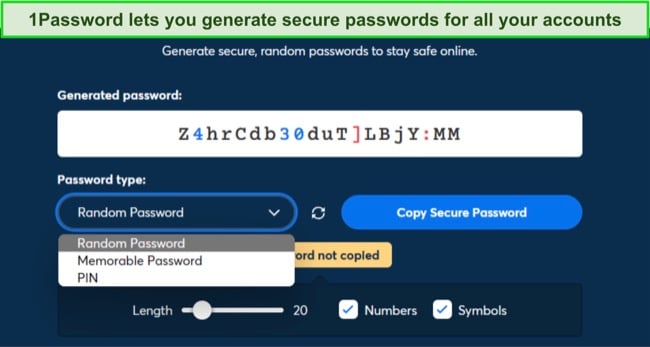
Another highlight of both apps’ password generators is that they automatically appear when signing up for new websites. When testing these apps, I found that they automatically ask to generate a secure new password for your account whenever you’re signing up. This functionality worked across all websites I tested and is quite useful, as the password is then auto-saved to be used later.
Since both apps have reliable password-generation tools, it’s a tie in this category.
Password Generator Winner: Tie
6. Privacy — Both Apps Have a Privacy-Focused Design
Considering the sensitive data a password manager holds, it must be built with a user’s privacy in mind. Thankfully, both 1Password and Dashlane are privacy-focused password managers that will never compromise your sensitive data.
The easiest way to tell if a password manager is privacy-focused is to check whether it has a zero-knowledge architecture, and both these apps do. Not even Dashlane or 1Password’s employees can ever know what’s in your vault, as the information is encrypted using a master password that only you have.
It’s also worth noting that both Dashlane and 1Password are SOC 2 Type 2 certified, meaning they use industry-standard data management practices.
However, 1Password was the winner in this category because it’s been independently evaluated by 3rd-party security companies including Cure53, AppSec, and CloudNative, which gives me added confidence.
Privacy Winner: 1Password
7. Password Auditing — It’s Easy to Monitor Your Password Safety Using either Option
The top password managers offer auditing tools to help monitor and manage your overall password safety. During tests, I found that both 1Password and Dashlane include useful auditing features that help ensure you have the safest passwords possible.
Dashlane’s auditing tool is the Password Health feature, which you can easily use via its web app and mobile apps. The Password Health feature informs you about any weak, reused, and compromised passwords you have. Plus, it gives you an overall security score and provides tips that you can use to improve weaker passwords.
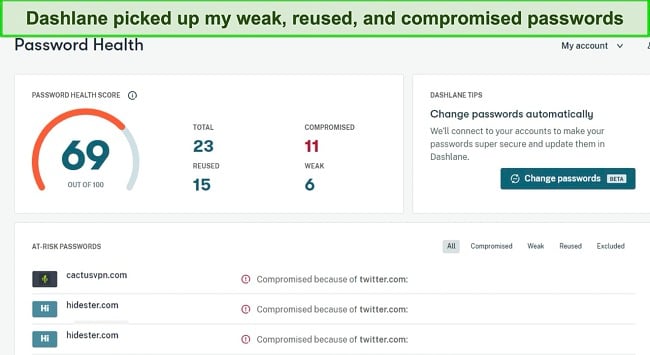
On the other hand, 1Password offers the Watchtower for password auditing. The Watchtower is just as effective as Dashlane’s Password Health feature. It tracks weak, reused, and compromised passwords. Also, it highlights accounts where you can activate two-factor authentication and websites that let you switch to passkeys for passwordless logins.
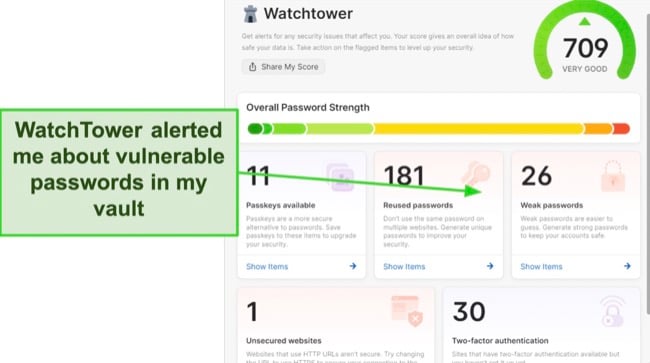
Overall, it’s a tie in this category, as both password managers provide reliable auditing tools.
Password Auditing Winner: Tie
8. Password Sharing — Both Password Managers Offer Safe Ways to Share Passwords and Information
Password sharing tools let you safely share passwords and other sensitive information with others. In my tests, I learned that both Dashlane and 1Password include reliable password-sharing features that let you safely give others access to your passwords.
Dashlane has a complete sharing center where you can select the items you want to share, enter a recipient’s email, and the app will share the items with them. Afterward, the recipient just has to install Dashlane if they haven’t already and access the shared credentials. You can also limit recipients — by only letting them use the passwords or giving them edit privileges.
1Password allows password sharing via Psst! (Password secure sharing tool) — an easy-to-use feature that lets you safely give others your passwords. You can create a link to share items with others, which they can easily access from anywhere for 1 hour, 1 day, 14 days, or 30 days. So you can set limits on how long others can access the information.
Overall, I’m quite pleased with the sharing features in both apps, as they safely and easily let you share passwords and sensitive data with others. So, it’s a tie in this category.
Password Sharing Winner: Tie
9. Ease of Use — Dashlane Is Easier to Install and Start Using
Although both password managers have beginner-friendly apps and extensions, I found Dashlane easier to install and use during my tests.
Dashlane works on desktop platforms via its various browser extensions, which you can set up within a few minutes. All its extensions include the necessary features, and you can also access the web app from anywhere to manage your passwords.
Besides the reliable web extensions, Dashlane has intuitive native Android and iOS apps. You can easily install these apps from your phone’s app store, log into your vault, and have them running within minutes. It’s easy to navigate the mobile apps and use the features they offer.
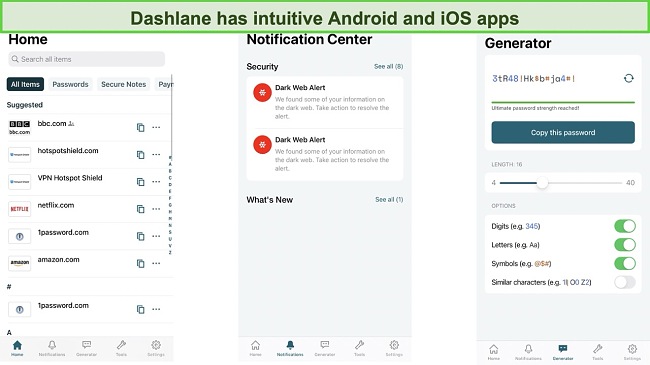
On the other hand, 1Password offers native apps for every major platform. You can download its app on Windows, macOS, Linux, Android, and iOS devices. All its native apps are easy to use, but they may take a bit longer to set up compared to Dashlane’s browser extensions.
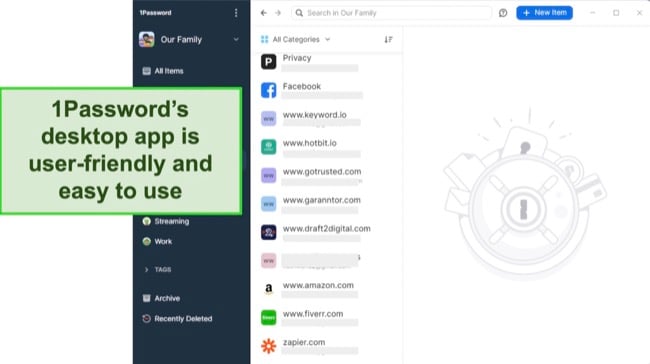
Overall, I consider Dashlane the more user-friendly option, as its extensions and apps are much easier to set up.
Ease of Use Winner: Dashlane
10. Extra Features — Both Apps Have Many Useful Password Management Features
Having unique extra features can help the best password managers stand out, and it turns out that both Dashlane and 1Password include some unique additional features. These extra tools allow these apps to provide better safety and convenience.
Dashlane excels in this category, as it has many features unavailable in other password managers. It includes a Hotspot Shield-powered VPN in its subscriptions. So, you can enjoy safer online connections while benefiting from Hotspot Shield features like the proprietary Hydra protocol. It’s not as good as the best standalone VPNs, but it’s a solid overall option.
Besides the VPN, Dashlane also includes dark web monitoring to check if any of your accounts were compromised. Also, you’ll get useful phishing protection with its auto-fill functionality.
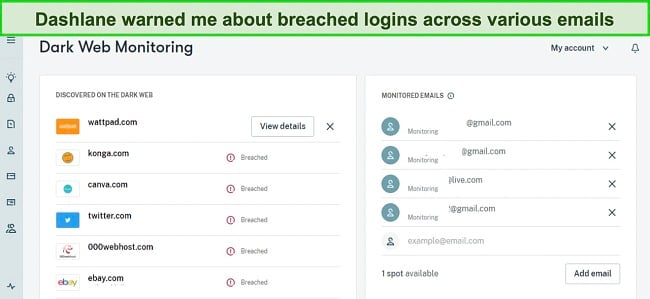
1Password is equally impressive when it comes to extra features. Its standout feature is the travel mode, which lets you hide certain vaults while traveling. Another unique 1Password feature is that it integrates with Fastmail and lets you create masked emails. You can use these emails on websites you don’t trust to avoid exposing your actual email.
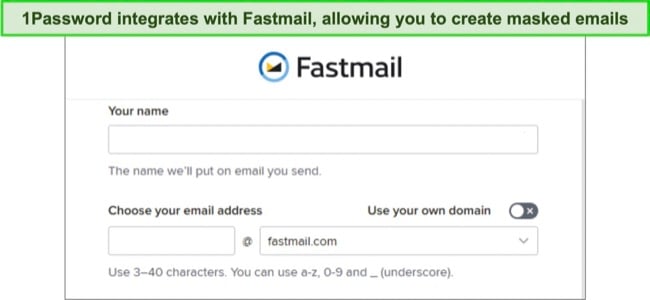
1Password also has privacy cards, which are secure virtual bank cards that let you keep your primary account details hidden.
Both password managers offer many useful extra features, so they are tied in this category.
Extra Features Winner: Tie
11. Device Compatibility — You Can Use Both Password Managers on All Major Platforms
A password manager must be compatible with multiple platforms to ensure you can safeguard your passwords on all your devices. Thankfully, Dashlane and 1Password work on all major platforms, meaning you can use either option on any device.
Dashlane works on Windows, macOS, Linux, iOS, and Android. It doesn’t have native desktop apps, but you can use it on all desktop platforms via the browser extensions. For mobile devices, Dashlane offers intuitive native Android and iOS apps that you can easily install and use.
1Password also works on Windows, macOS, Linux, iOS, and Android devices. It offers native apps for all desktop and mobile platforms, but you can also use it on desktops via browser extensions. All of 1Password’s apps have beginner-friendly setups, meaning you won’t have issues setting them up.
Since both these apps work on all mainstream platforms, they’re tied in this category.
Device Compatibility Winner: Tie
12. Customer Service — Dashlane’s Support Is More Responsive
It’s critical for a password manager to offer reliable customer support, as this lets you get the help you need if you face issues or need help with a certain feature. In my tests, I found that both Dashlane and 1Password offer various responsive support channels, but Dashlane’s support remained superior in my tests.
What helps Dashlane stand out in this category is that it offers live chat, while 1Password doesn’t. Dashlane’s live chat support is available Monday through Friday between 9am and 5pm Eastern time. I connected to an agent within minutes whenever I used Dashlane’s live chat support, and they all provided helpful answers to all my questions.
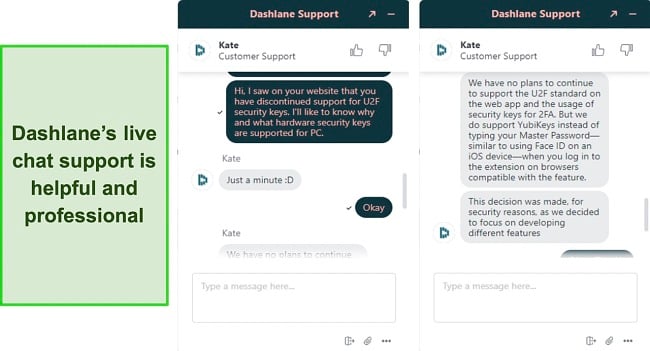
Besides the live chat, Dashlane offers a ticket-based support system and a detailed online knowledge base. The ticket system is great if you have a question that isn’t urgent, while the knowledge base has lots of useful troubleshooting information and FAQs.
1Password doesn’t have live chat support, but its other channels are very helpful. I was especially impressed to see that 1Password’s email support always responded to my questions in under an hour. Plus, the answers were detailed and had the information I was looking for.
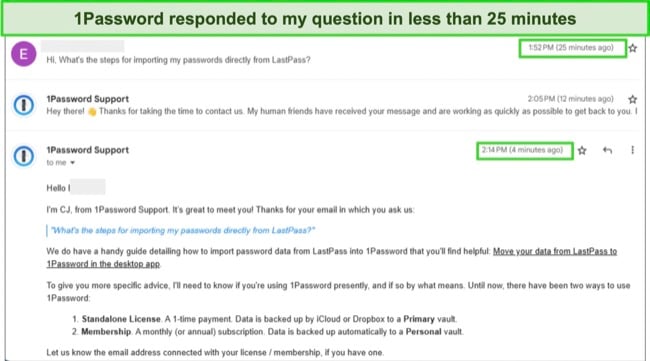
You’ll also get a detailed knowledge base and community forums with 1Password. The community forums let you contact various experts and other 1Password users directly, while the knowledge base has lots of tutorials, FAQs, and troubleshooting guides.
While both apps offer impressive customer support, Dashlane wins here because it includes live chat support.
Customer Service Winner: Dashlane
13. Price — You’ll Get More Value for Money With Dashlane’s Plans
While both password managers are worth their price, I found that Dashlane’s plans deliver better value for money.
Dashlane’s plans start at $4.99/month, with the Family plan costing slightly more. Although both password managers deliver good value, what sets Dashlane apart is that it includes Hotspot Shield’s VPN in its plans. This makes it a great deal, as even the best monthly VPN subscriptions may cost more than Dashlane if purchased separately.
Similarly, 1Password’s pricing starts at $4.99/month for the Premium plan, with a slightly increased price for the Family plan. You’ll get all the necessary password management features for this price, but the lack of a VPN makes it worse value than Dashlane’s plans.
Both password managers have the same price for their Family plan, but Dashlane delivers better value here as well. Dashlane’s Family plan allows up to 10 members, while 1Password only allows up to 5 family members.
Overall, it’s clear that Dashlane is the winner here. Its plans deliver more value for money, thanks to the VPN. Also, its Family plan allows more members than 1Password’s Family plan.
Price Winner: Dashlane
14. Free Version — Only Dashlane Has a Free Plan
Premium password managers offer many worthwhile features for the price. However, many people only need basic password management functionality that you can get from a free plan. For this purpose, Dashlane is the better choice, as it comes with a completely free plan. On the other hand, 1Password doesn’t include a free plan at all.
With the free plan, Dashlane lets you store up to 25 passwords, utilize the auto-save and fill features, save up to 1GB of files, and use the password generator. Of course, you won’t get features like automatic sync across multiple devices or Dashlane’s VPN. However, it’s a reliable free plan effective for basic password management.
Dashlane is the clear winner here, as it’s the only option with a free plan.
Free Version Winner: Dashlane
15. Money-Back Guarantee — Dashlane Has a Generous Money-Back Guarantee
Money-back guarantees let you test an app risk-free before you commit to a purchase. Unfortunately, Dashlane is the only one of these apps with a money-back guarantee, as 1Password only has a 14-day free trial.
Dashlane has a 30-day money-back guarantee, meaning you’ll get a long time to try its features completely risk-free. If you’re unsatisfied, you can easily contact support and get a refund, no questions asked.
Since only one of these apps includes a money-back guarantee, Dashlane wins in this category.
Money-Back Guarantee Winner: Dashlane
And the Winner Is… Dashlane
It was a tough competition, as both these password managers are among the best available. However, Dashlane emerges victorious overall. It’s tied with 1Password in 7 categories but wins in 5, while 1Password only wins in 2 categories.
- Encryption — Tie
- Two-Factor Authentication (2FA) — Tie
- Password Storage — 1Password
- Auto-Save and Fill — Dashlane
- Password Generator — Tie
- Privacy — 1Password
- Password Auditing — Tie
- Password Sharing — Tie
- Ease of Use — Dashlane
- Extra Features — Tie
- Device Compatibility — Tie
- Customer Service — Dashlane
- Price — Dashlane
- Free Version — Dashlane
- Money-Back Guarantee — Dashlane
1Password has its strengths, like the robust vault and the fact that it’s cleared multiple independent audits. Also, 1Password has unique features like masked emails and privacy cards.
However, between both options, Dashlane is the better choice if you want a more well-rounded password manager. It offers more features, better value for money, and live chat customer support. Also, it has a generous 30-day money-back guarantee that lets you try Dashlane risk-free.
Overall Winner: Dashlane
How to Install Dashlane on Windows
The following steps explain how you can install Dashlane on your device. I’m using Windows here, as it’s the most popular platform for this app. Note that Dashlane doesn’t have native desktop apps, meaning you must use it via browser extensions. It does have native apps for Android and iOS, though.
- Choose a plan. Navigate to Dashlane’s plans and pick the one that suits you.
![Screenshot of Dashlane's various price plans]()
- Install Dashlane’s extension. Add the Dashlane extension to your browser.
![Screenshot showing how to add Dashlane to your browser]()
- Create an account. Enter your email to start creating a Dashlane account.
![Screenshot showing how to set up your Dashlane account]()
- Set a master password. Set a strong master password for your vault.
![Screenshot showing how to set a master password for your Dashlane vault]()
- Use Dashlane. Protect your passwords and other sensitive data with Dashlane.
![Screenshot showing Dashlane's interface after it's been set up]()

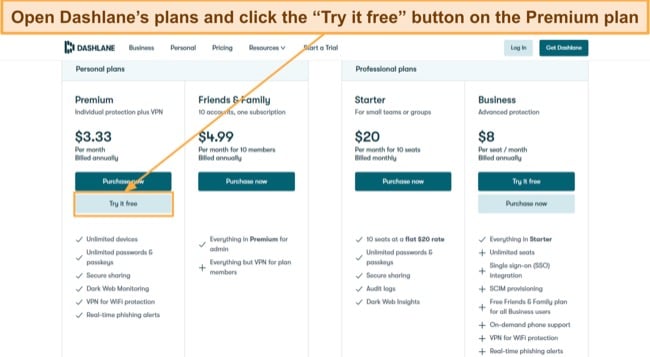
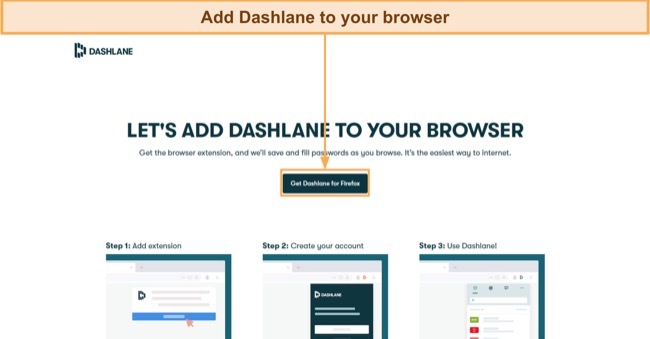
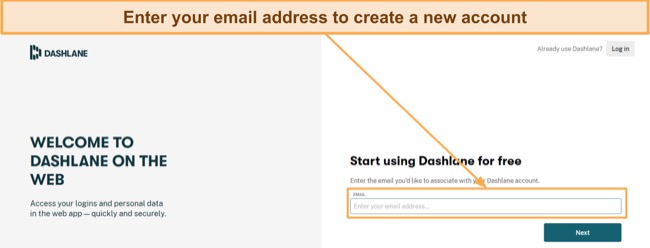
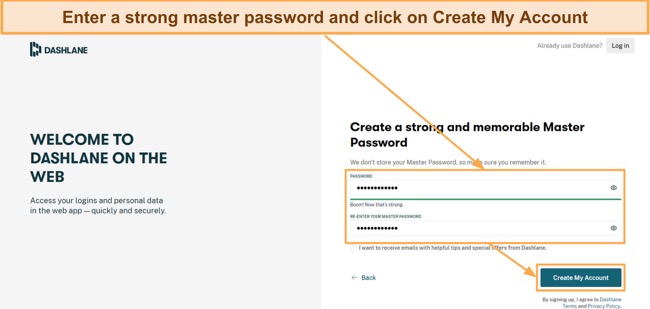
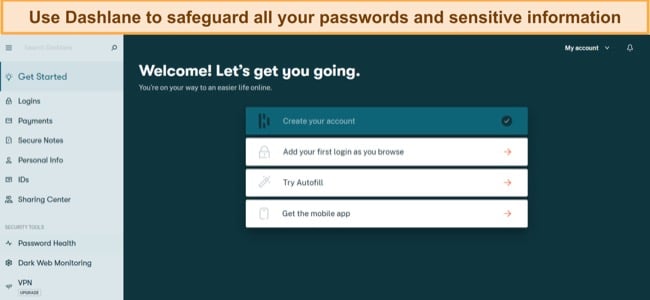
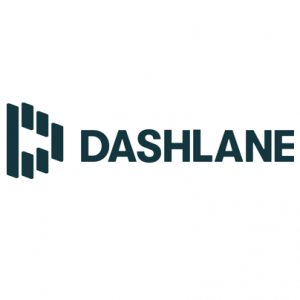
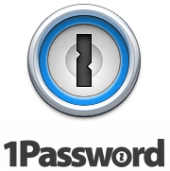


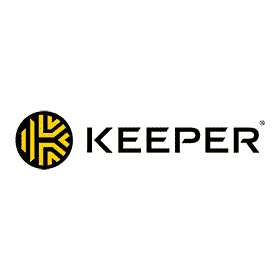

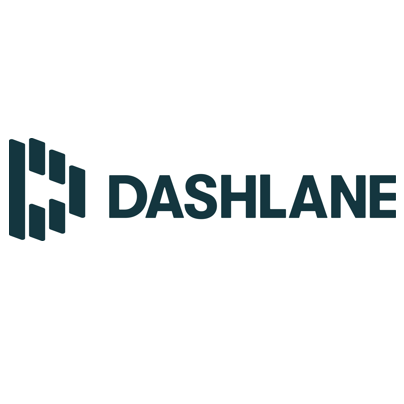
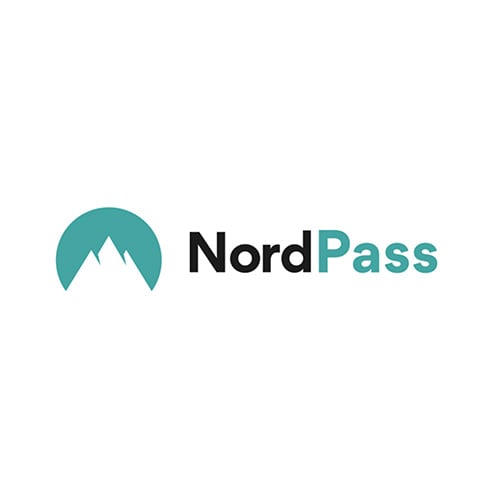


Leave a Comment
Cancel